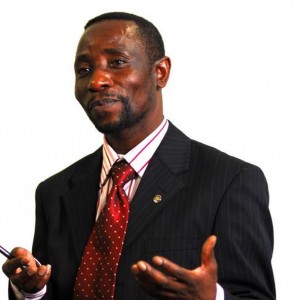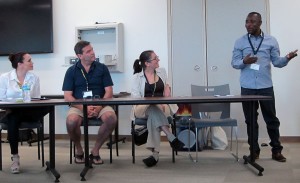Attended by several faculty, staff, students, and alumni of the UM-Flint School of Education & Human Services, the Institute for Innovation in Education’s (iiE) recent March Gathering at Florida Keys Community College brought together many creative professionals from around the world to share their ideas centering around topics in education and educational technology. Here we highlight Cissa Wa Numbe who emphasizes the importance of interacting with others from a global perspective.
Submitted by Susanna Hapgood, Ph.D., Associate Professor, Dept. of Curriculum and Instruction, University of Toledo
The 7th iiE (Institute for Innovation in Education) Gathering in partnership with UM Flint and hosted at Florida Keys Community College has attracted participants from all over the globe – from as far as British Columbia, Canada, and even from the Democratic Republic of Congo. Well, in this person’s case, he actually just came from a meeting in Tanzania, and before that was in Mali.
Who is this world-traveling dervish? None other than Mr. Cissa Wa Numbe, the Secretary General of the United Nations Association of the Democratic Republic of the Congo. In addition, he teaches Peace Studies and Human Rights at four universities, two in the Congo (Catholic University of Bukavu and the University of Kinshasa) as well at the International University of Geneva and Brandford University in the United Kingdom. Among the work he does is to consult with civil service organizations and government officials on how to promote peace and human rights according to international standards with a focus on conflicts and mass atrocities and violence prevention. In addition, he trains UN peace-keeping staff about how the United Nations works and mentors faculty in various countries about how to organize model United Nations events at universities. This is one busy guy!
So why, you might wonder, did Cissa Wa Numbe, leave a convention in Tanzania, where he was sharing his analyses of how some types of speech can catalyze violence (to be better able to disrupt and prevent such violence) two days early to attend the iiE Gathering?
It was, he said, because he admired and wanted to experience the highly interactive discussions and learn from the ideas that would be shared at the iiE Gathering around some issues of particular interest to him. Specifically, he decided to attend the iiE Gathering because there are several books he’s written that he would like to turn into more engaging and interactive technology-enhanced materials. One of the books is a child-friendly guide to the United Nations Convention on the Rights of the Child that is currently being used in secondary schools in the Congo and elsewhere. Cissa hopes to make it more readily accessible and captivating by using technological tools to enhance users’ understanding of the content of the text. Similarly, he hopes to use technology to better disseminate the ideas in a manual he has written that is aimed at helping women better understand their rights and fulfill their potential. He is also working on developing a game that could introduce the complexities of peace building and conflict resolution to middle and high school students.
“My experiences at the iiE Gathering keep me thinking about how important it is create opportunities for people to interact and share their work. Staying in one’s own corner will not let us change people’s lives,” he said. “If we don’t regularly interact with others, we end up doing things in a limited way. We need to make the world more global, share what we do, share our limitations and challenges, and keep on learning from one another.”
After the iiE Gathering, Cissa will be off to the United Kingdom for four days of teaching and then to the Congo, where on March 18 he is leading a symposium recognizing women leaders in the Congo. There he plans to tell them and aspiring women leaders to keep on fighting for gender equality by showing others their capacity to do good works in their communities.


